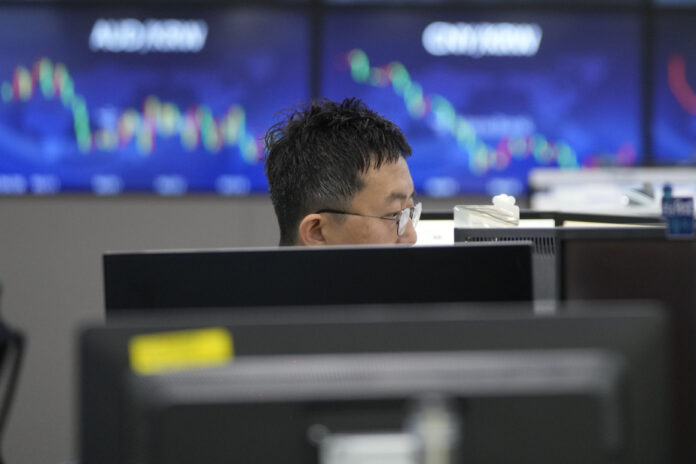(Paris) Global stock markets are broadly stable on Wednesday, pending the release of “Fed minutes”, while Asian indices fell, showing concern about China’s economic health.
Around 7:30 a.m. EST, Paris (-0.02%) and Frankfurt (0.08%) were stable. London fell by 0.44% after the publication of a sharp slowdown in inflation in the United Kingdom in July, to 6.8% over one year against 7.9% in June, however remaining the highest of the countries of the G7.
In response, the pound rose against the dollar and the euro, but not enough to dismiss expectations of further rate tightening by the Bank of England.
The British currency took 0.26% against the greenback, to 1.2739 dollars for one pound, and climbed 0.16% against the euro to 85.69 pence for one euro.
The dollar lost 0.11% against the euro at 1.0917 dollars for one euro.
Also on the agenda for the session is the publication of the “Fed Minutes”. The minutes of the last meeting of the American monetary institution should “show that its officials remain cautious, despite the latest drop in inflation” in the United States, adds Ipek Ozkardeskaya.
Also on Tuesday, a member of the US Federal Reserve said it was still too early to claim victory over inflation and end the cycle of interest rate hikes, while acknowledging that inflation was now moving in the right direction.
“I’m not ready to announce that we’re done, but I see positive signs,” Minneapolis Branch President Neel Kashkari said at a conference in the northern US city.
“I want to see convincing evidence that inflation is indeed on the verge of getting back to 2%, then it will take some time to stabilize it there,” Kashkari replied when asked about the opportunity for a possible rate cut.
At around 7:25 a.m. EST, futures for the three major U.S. indices were hovering around balance.
In Asia, Hong Kong fell 1.36% in latest trade and Tokyo closed sharply lower, with the flagship Nikkei index down 1.46%.
After the publication on Tuesday of Chinese economic indicators deemed worrying and which led to numerous articles in the press and a fall in world stock markets, Beijing defended itself on Wednesday.
“A small number of Western politicians and media are exaggerating and hyping up the periodic difficulties of China’s post-epidemic economic recovery. In the end, the facts will prove them wrong,” Wang Wenbin, a Chinese Foreign Ministry spokesperson, said on Wednesday.
On the CNBC financial channel, Chris Wolfe of Fitch recalled that the rating agency had negatively revised its opinion on the general health of the financial sector at the end of June without this having been really noticed.
But if that overall rating were to be downgraded, “it would lead to a recalibration of financial barometers and likely result in downgrades” for individual banks, the analyst said, sparking sharp risk aversion in equity markets.
In London, around 7:20 a.m. (Eastern time), NatWest dropped 2.10%, Standard Chartered 1.46%, Lloyds 0.59% and HSBC 0.92%. In Milan, Intesa Sanpaolo dropped 0.74%, UniCredit 1.12%. In Frankfurt, Deutsche Bank lost 0.35%. In Paris, Credit Agricole dropped 0.52%.
Oil prices stabilized on Wednesday before US stocks, amid concerns about Chinese demand and tight supply, when European natural gas rose in the face of threats of strikes at major Australian facilities.
Around 7:20 a.m. (Eastern time), a barrel of Brent from the North Sea, for October delivery, lost 0.14% to 84.77 dollars, as did its American equivalent, a barrel of West Texas Intermediate. (WTI), for September delivery, at $80.90.
On the natural gas side, the Dutch TTF futures contract, considered the European benchmark, dropped 2.35% to 37.90 euros per megawatt hour (MWh).





